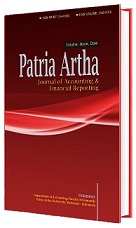KINERJA KEUANGAN PT. BANK SYARIAH (BSI) SEBELUM DAN SETELAH MERGER
Abstract
This study aims to determine the financial performance of PT Bank Syariah Indonesia (BSI) before and after the merger. Company performance is measured using financial ratios: Non Performing Financing Net (NPF Net), Non Performing Financing Gross (NPF Gross), Capital Adequacy Ratio (CAR), Operating Expenses to Revenue (BOPO), Net Interest Margin (NIM), Loan to Deposit Ratio (LDR), Loan to Asset Ratio (LAR), Return on Assets (ROA), Return on Equity (REO) and Net Operating Margin (NOM). This type of research is quantitative research with secondary data analysis. The population in
this study are all financial statements of PT Bank Syariah Indonesia before and after the merger. The sample of this study is the Financial Statements of PT Bank Syariah Indonesia in 2019-2022. The analysis method in this research is descriptive analysis method. The results showed that: (1) there was an increase in the company's financial performance in the NPF Net ratio, because there was a decrease between nonperforming financing and total financing disbursed (2) there was an increase in the company's financial performance in the CAR ratio, because there was an increase in the company in making a significant contribution to profitability. (3) There was an increase in the company's financial performance in the BOPO ratio, because the company was more efficient in controlling its operating expenses. (4). There was no increase in company performance on the NIM ratio but the company remained stable in utilizing productive assets to generate interest income. (5). There is an increase in the company's financial performance in the LDR ratio, although the LDR value is getting higher, but with the high lending to customers the company has the potential to reap more interest income. (6) there was a decrease in the company's financial performance in the LAR ratio, although it increased, the company was still classified as healthy in meeting credit demand using the total assets owned by the company (7) There is an increase in the company's financial performance both in the ROA, REO and NOM ratios where the company is able to increase its profits in utilizing its assets, capital and productive assets.
Keywords
Full Text:
PDFReferences
Abdul Ghofur Anshori. (2014).
Penerapan Prinsi Syariah
dalam Lembaga Pembiayaan
dan Perusahaan Pembiayaan.
Yogyakarta : Pustaka Pelajar.
Agus, Sartono. (2015). Manajemen
Keuangan Teori dan Aplikasi.
Edisi Keempat. Yogyakarta :
Badan Penerbit Fakultas
Ekonomi.
Anisah dan Triyonowati, (2016).
Analisis Kinerja Keuangan Sebelum
dan Sesudah Merger PT. Chandra
Asri Petrochemical, Tbk. Jurnal
Ilmu dan Riset Manajemen, 5(6).
Elvera, & Yesita Astarina. (2021).
Metodologi
Penelitian.
Yogyakarta. CV. Andi Offset.
Hery Alecander. (2023). Memahami
Laporan Keuangan dan Analisisnya. Jakarta. Papas
Sinar Sinanti.
Kasmir. (2015). Analisis Laporan
Keuangan. Jakarta: PT. Raja
Grafindo.
Kasmir. (2016). Pengantar Manajemen
Keuangan Edisi 2. Jakarta: PT
Prenada Media Group.
Sutama. (2016). Metode Penelitian
Pendidikan:
Kuantitatif,
Kualitatif, PTK, R & D.
Surakarta : Fairiz Media.
Susilo, Sri Y, dkk. (2014). Bank dan
Lembaga Keuangan Lainnya.
Jakarta. Salemba Empat.
DOI: https://doi.org/10.33857/jafr.v8i1.831
Refbacks
- There are currently no refbacks.
Editorial Office: Department of Accounting, Faculty of Economic, Patria Artha University. Jln. Tun Abdul Razak (Hertasning Baru), Poros Makassar–Gowa, South Sulawesi, Indonesia. | Tel./Fax : +62411-8225111 / +62411-8225112 | Email : jafre@patria-artha.ac.id













 `
`